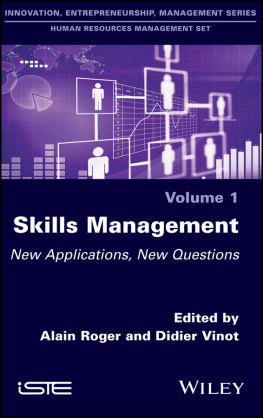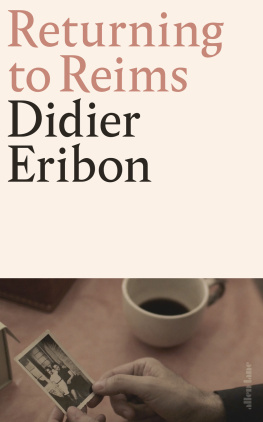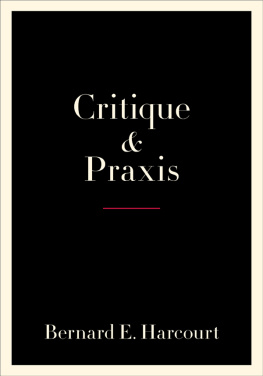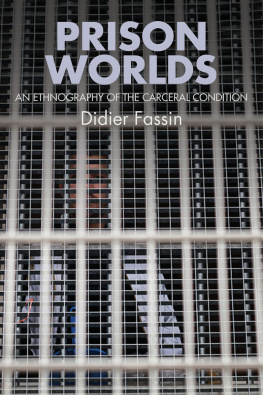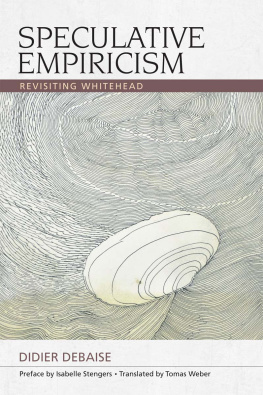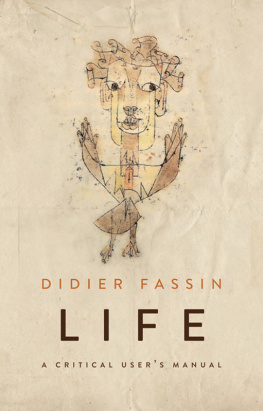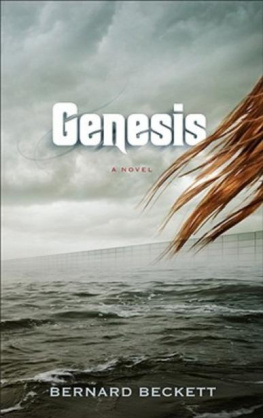Didier Fassin and Bernard E. Harcourt - A Time for Critique
Here you can read online Didier Fassin and Bernard E. Harcourt - A Time for Critique full text of the book (entire story) in english for free. Download pdf and epub, get meaning, cover and reviews about this ebook. year: 2019, publisher: Columbia University Press, genre: Politics. Description of the work, (preface) as well as reviews are available. Best literature library LitArk.com created for fans of good reading and offers a wide selection of genres:
Romance novel
Science fiction
Adventure
Detective
Science
History
Home and family
Prose
Art
Politics
Computer
Non-fiction
Religion
Business
Children
Humor
Choose a favorite category and find really read worthwhile books. Enjoy immersion in the world of imagination, feel the emotions of the characters or learn something new for yourself, make an fascinating discovery.

- Book:A Time for Critique
- Author:
- Publisher:Columbia University Press
- Genre:
- Year:2019
- Rating:3 / 5
- Favourites:Add to favourites
- Your mark:
- 60
- 1
- 2
- 3
- 4
- 5
A Time for Critique: summary, description and annotation
We offer to read an annotation, description, summary or preface (depends on what the author of the book "A Time for Critique" wrote himself). If you haven't found the necessary information about the book — write in the comments, we will try to find it.
A Time for Critique — read online for free the complete book (whole text) full work
Below is the text of the book, divided by pages. System saving the place of the last page read, allows you to conveniently read the book "A Time for Critique" online for free, without having to search again every time where you left off. Put a bookmark, and you can go to the page where you finished reading at any time.
Font size:
Interval:
Bookmark:
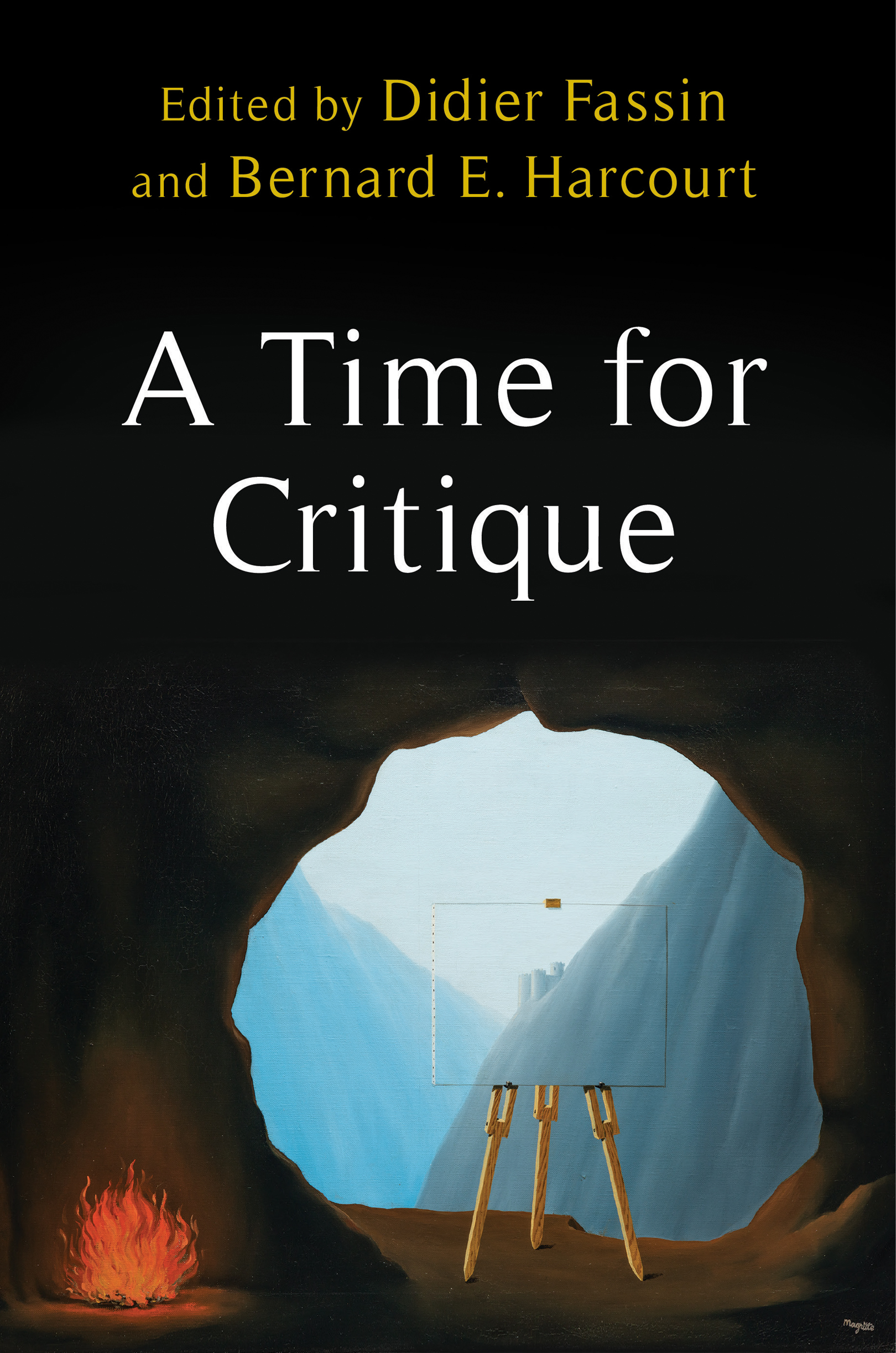
A TIME FOR CRITIQUE
NEW DIRECTIONS IN CRITICAL THEORY
NEW DIRECTIONS IN CRITICAL THEORY
Amy Allen, General Editor
New Directions in Critical Theory presents outstanding classic and contemporary texts in the tradition of critical social theory, broadly construed. The series aims to renew and advance the program of critical social theory, with a particular focus on theorizing contemporary struggles around gender, race, sexuality, class, and globalization and their complex interconnections.
For a complete list of titles, see
A TIME FOR CRITIQUE
EDITED BY
DIDIER FASSIN AND
BERNARD E. HARCOURT
Columbia University Press
New York

Columbia University Press
Publishers Since 1893
New York Chichester, West Sussex
cup.columbia.edu
Copyright 2019 Columbia University Press
All rights reserved
E-ISBN 978-0-231-54931-8
Library of Congress Cataloging-in-Publication Data
Names: Fassin, Didier, editor.
Title: A time for critique / edited by Didier Fassin and Bernard E. Harcourt.
Description: New York : Columbia University Press, 2019. | Series: New directions in critical theory | Includes bibliographical references and index.
Identifiers: LCCN 2018060758| ISBN 9780231191265 (cloth : alk. paper) | ISBN 9780231191272 (pbk. : alk. paper)
Subjects: LCSH: Critical thinking. | PhilosophyPolitical aspects.
Classification: LCC B809.2 .T56 2019 | DDC 142dc23
LC record available at https://lccn.loc.gov/2018060758
A Columbia University Press E-book.
CUP would be pleased to hear about your reading experience with this e-book at .
Cover design: Noah Arlow
CONTENTS
DIDIER FASSIN AND BERNARD E. HARCOURT
DIDIER FASSIN
LINDA M. G. ZERILLI
AYE PARLA
PETER REDFIELD
KAREN ENGLE
MASSIMILIANO TOMBA
VANJA HAMZI
LORI ALLEN
FADI A. BARDAWIL
NICK CHEESMAN
DAVID KAZANJIAN
ANDREW DILTS
ALLEGRA M. MCLEOD
BERNARD E. HARCOURT
T he present volume has been prepared during the year 2017 through a series of seminars followed by a two-day workshop in the School of Social Science at the Institute for Advanced Study. We express our gratitude to Laura McCune for the congenial organization of these events and to Munirah Bishop for the thorough copyediting of the manuscript. We are also thankful to Wendy Lochner and Lowell Frye at Columbia University Press for their unwavering support of our project.
DIDIER FASSIN AND BERNARD E. HARCOURT
T he first decades of the twenty-first century have been marked by an accumulation of deeply troubling political events occurring in the wake of a global war on terror and the consolidation of neoliberal policies worldwide. The unexpected vote on Brexit, the unforeseen election of Donald Trump as president of the United States, the coming to power of authoritarian leaders in Italy and Austria, the illiberal turn of presumably democratic countries, such as Hungary and Poland, and the spectacular rise of nationalist and xenophobic parties in France, Germany, Denmark, Sweden, and the Netherlands have shaken the Western world order. But this preoccupying polymorphic drift of politics has not spared the rest of the planet, from Egypt to Israel, from Turkey to India, from Venezuela to Brazil, from Thailand to the Philippines.
The global instability has generated a flow of somewhat baseless and sometimes contradictory interpretations by media commentators and public intellectuals always quick to recycle ready-made theories or offer skin-deep concepts, like posttruth. Meanwhile, this political evolution has left many social scientists in disarray. They were all the more distraught that they had not seen this wave coming and did not have adequate tools to analyze it. Moreover, they were confronted with the multiplication of so-called fake news and conspiracy theories, which mimicked critical thinking, and with the expansion of social media, which tended to displace traditional channels used by critics in the public sphere.
In these times of crisis, the predicament of critique coincided with contestation over its relevance and even the foretelling of its death, often by the very representatives of its self-proclaimed avant-garde in the social sciences and literary studies. Had not criticism gone too far, they asked? Was it not in part because of its excesses that people had lost their discernment in their questioning of knowledge and power, thereby rendering us all receptive to alternative facts and threatening ideologies? Was there not, then, a moral obligation, as well as an epistemological necessity, to reconsider critiques pertinence, and to move on, in order to address more pressing issues?
This reactionary stand was contemporaneous with a series of attacks launched in the academic world against critical theory as well as feminist studies, postmodern theory as well as postcolonial studies. Interestingly, the offensive also came at a time when positivism appeared to be at its peak in the social and cognitive sciences, with the ascendency of big data, the development of experimental techniques, the hegemony of the rational actor paradigm, and the supremacy of evidence-based research. This trend was itself supported by governments as part of the growing field of expertise and encouraged by the corporate world in the name of efficacy. Critical thinking carried little weight by contrast to this powerful alliance of science, politics, and economy.
The present undertaking stems from this dual series of challenges presented by both critical events and critical interpellations. Concerned by the increasingly disconcerting situation, a group of scholars from various disciplines of the social sciences and humanities decided to meet on a regular basis over the course of a year to discuss these challenges. What sort of critical thinking is needed in a time when its very existence seems threatened? How can one maintain sufficient distance from the ubiquitous and eventful present without doing it an injustice? How can we address contemporary issues without repudiating the intellectual legacies of the past? To what extent could critique still be a project for the future? These are some of the questions that we tackled based on our experiences of theoretical and empirical research in political science, philosophy, law, history, literature, sociology, and anthropology.
However, while it is important to evoke this context, which did incentivize our project, it is also crucial to emphasize that the book is neither a direct response to the current state of the world from a critical perspective, nor a systematic defense against the multifaceted rebuke to critical thinking. Indeed, whereas we take these challenges seriously, we want to distance ourselves from their immediacy and avoid the all-too-common reactive attitude to events and interpellations. With the sense of urgency often come hasty analyses, which are later refuted. For us, on the contrary, critique must allow time for consideration. We firmly believe that the challenges critique faces today call for a reappraisal of its practice, and simultaneously a deepening and a displacement of our own reflection. Reappraisal requires a reexamination of the meaning, significance, and complications of the critical gesture, and its reinscription in its political genealogy, historical temporality, and cultural diversity. Displacement entails the systematic questioning of the self-evidences of critical interventions and the recognition of their obscured issues, ignored debates, and neglected alternative traditions. In sum, far from deploring the challenges that critique faces today, we consider that they offer a unique opportunity for its thorough reassessment and a potential for novel openings. To be faithful to its core principle, critique must involve its self-critique. That is the only way, in these critical times, to move forward.
Font size:
Interval:
Bookmark:
Similar books «A Time for Critique»
Look at similar books to A Time for Critique. We have selected literature similar in name and meaning in the hope of providing readers with more options to find new, interesting, not yet read works.
Discussion, reviews of the book A Time for Critique and just readers' own opinions. Leave your comments, write what you think about the work, its meaning or the main characters. Specify what exactly you liked and what you didn't like, and why you think so.

